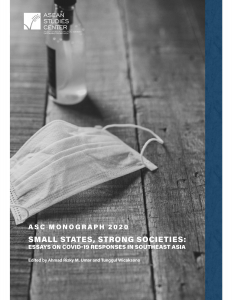“Small States, Strong Societies: Essays on COVID-19 Responses in Southeast Asia”
The national response in ASEAN member states to Covid-19 indicates a vast disparity between countries. There are apparent discrepancies in fatality rates and the number of daily infections in all ASEAN member states. Moreover, we witness differing policy approaches undertaken by ASEAN member states to respond to the Covid-19 pandemic. Some states have taken proactive and strict policy measures to flatten the curve, informed by proper epidemiological consideration, and some other states have been in denial of the virus threat for fear of adverse economic repercussions.
What explains these different approaches and outcomes in Covid-19 responses in ASEAN member states, and what has been done by ASEAN and its member states to tackle this global pandemic problem effectively? ASC Monograph 2020 tackles these questions by bringing about a regional and cross-national perspective to understand the Covid-19 response. Seven essays in the monograph show that three aspects explain the inequality of Covid-19 responses in Southeast Asia: the differing degree of state capacity, the resilience of society, and the regional cooperation. There is a range of issues discussed in the monograph: Vietnam’s strong Covid-19 response, Thailand’s digital resilience, and human security problems in Indonesia’s Covid-19 response. There are also cross-national issues such as the problem of migrant workers in Thailand and Malaysia, and ASEAN’s institutional framework for disease control and prevention.
ASC Monograph 2020 offers a regional and cross-national perspective to Covid-19 responses. We believe that since the Covid-19 pandemic is a regional and global problem, it also requires a solid regional and global response. What ASEAN member states have done is, of course, far from ideals. But there are lessons to be learned, and it will be a great asset to navigate our pathway for recovery in the meantime.

